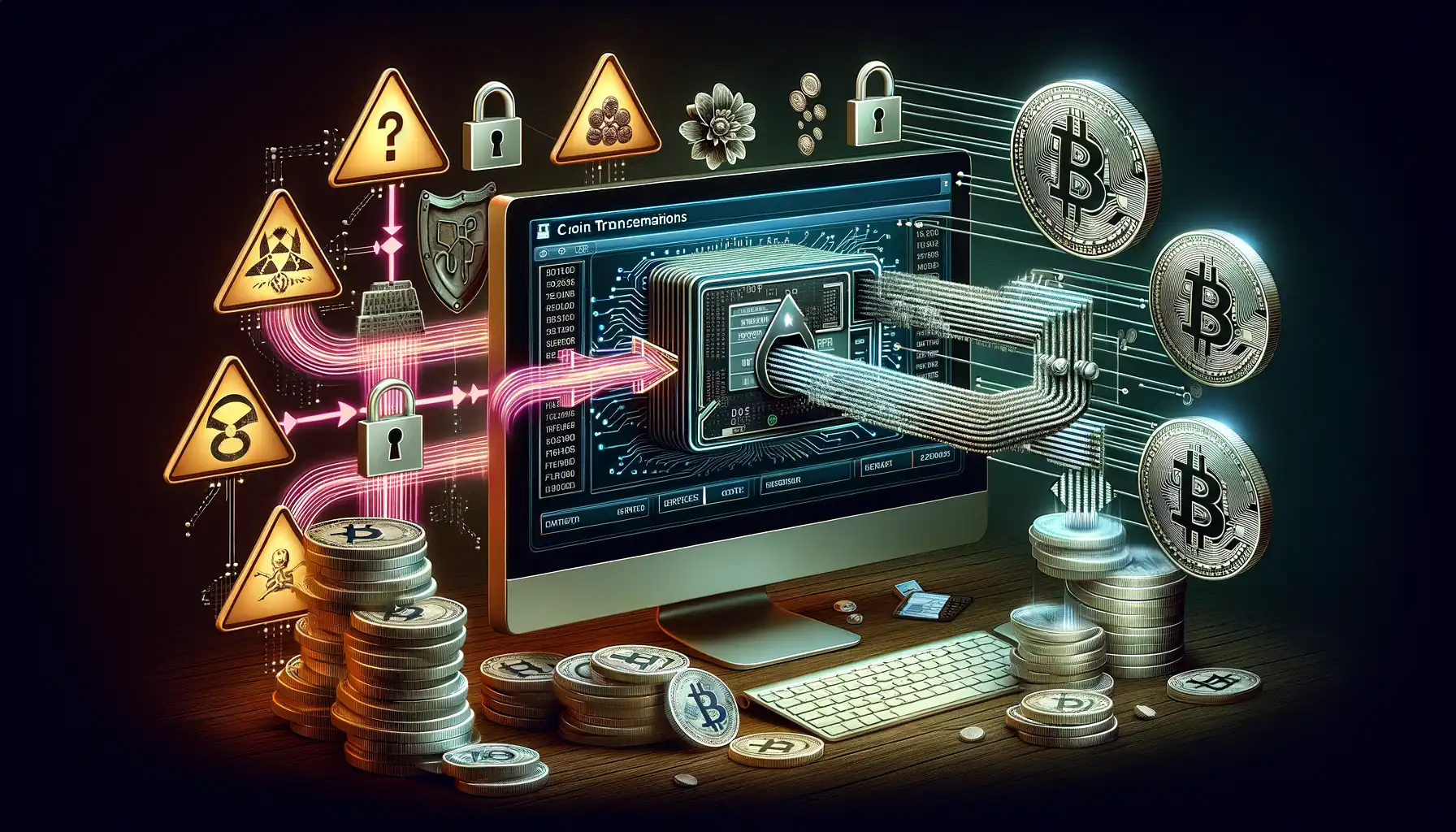Understanding Online Coin Transactions and Their Risks
Diving Into the World of Online Coin Transactions
Let’s picture it—you’re holding a shiny, golden coin in your hand. Now imagine that coin exists only online, living in a digital vault, traveling through pathways made of zeros and ones to reach someone else. That’s the magic (and challenge) of online coin transactions. Whether you’re buying, selling, or trading cryptocurrency or virtual game tokens, these transactions are both thrilling and complex.
Yet, behind this modern convenience lies a hidden web of risks. This isn’t just about forgetting your password—or, as some tragic tales show, losing access to your digital wallet forever. No, the real dangers lurk in the shadows: cyber criminals, phishing attempts, and malware designed to creep in unnoticed. And let’s not forget human errors. A single typo in entering an address? That’s enough to send your precious coins into a void.
The Hidden Traps Behind the Click
What are the risks? Here’s a breakdown that might make your palms sweat:
- Phishing websites: Dressed to impress, these fake sites mimic trusted platforms, tricking users into handing over sensitive details.
- Man-in-the-middle attacks: Hackers intercept information mid-transfer, scooping up data like a pickpocket at rush hour.
- Rogue wallets or exchanges: Not all platforms are legit—some exist solely to drain your funds.
Remember, these aren’t sci-fi scenarios. They happen, and they happen often. Protecting yourself starts with understanding this invisible battleground before you hit “send”.
Key Cybersecurity Threats in Online Coin Transactions

Beware of the Digital Shadows: Phishing, Malware, and Hacking
The world of online coin transactions isn’t all shiny treasure—there are dark forces lurking in the digital shadows. Take phishing, for example. Cybercriminals love to disguise themselves as trusted platforms or individuals, sending emails or pop-ups that trick you into revealing your login credentials. It’s like a con artist wearing a mask—they’ll dupe you before you even realize it.
And then there’s malware. One wrong click, one shady download, and you’ve got malicious software crawling through your system. Keyloggers can silently capture every keystroke you make, including passwords to your cryptocurrency wallet. That’s not just frustrating—it’s terrifying.
Finally, let’s talk hacking. If cybercriminals manage to exploit vulnerabilities in platforms where your coins are stored, they can infiltrate accounts, manipulate balances, or drain funds faster than you can hit refresh. And guess what? Most victims never see it coming.
- Phishing: Fake emails or websites impersonating legitimate entities.
- Hacking: Exploiting platform weak spots to access personal funds.
- Malware: Silent tools like keyloggers tracking and stealing sensitive data.
Stay vigilant, because in this game, the stakes aren’t just coins—they’re your peace of mind.
Best Practices to Ensure Secure Coin Transactions

Keep Your Wallets Safe and Sound
Imagine your digital coin wallet as a treasure chest—it holds your hard-earned wealth, and the last thing you want is a pirate sneaking in to loot it. The first rule of thumb? Use a secure and trusted wallet. Opt for wallets with multi-factor authentication (MFA), which acts like a double-locked door, requiring two keys to open: one digital, one personal.
Now let’s address passwords. A weak password is like leaving a key under the doormat—convenient but risky. Create strong, unique passwords packed with numbers, symbols, and a dash of creativity. For example, “C0!n$4L!fe” beats “password123” every time.
Lastly, don’t trust anyone blindly. That email claiming to be from a support team? Probably a scammer fishing for your private keys. Stick to official websites and never share sensitive information over emails or suspicious links.
Double Down on Transaction Security
When sending coins, think of it as mailing a package filled with gold bars—you’d double-check the address, right? Always verify recipient details, even if it’s someone you trust. A simple typo could send your funds into the abyss.
Here are some golden rules:
- Always confirm transactions on multiple levels—browser, wallet, and personal memory.
- Use QR codes for accuracy when possible to avoid manual errors.
- Enable notifications to track all transaction activity in real time.
The fewer mistakes you make upfront, the less likely you’ll face heart-stopping moments later. Secure transactions demand vigilance, but it’s worth the peace of mind.
The Role of Advanced Cryptography in Transaction Security

How Cryptography Acts as Your Digital Bodyguard
Imagine conducting an online coin transaction as if you’re passing a precious gem through an unbreakable, invisible tube that only the receiver can access. That’s the magic of advanced cryptography—it takes your sensitive data and wraps it in layers of secrecy so dense that cybercriminals might as well be trying to crack a safe with a toothpick.
At the heart of this digital shield are techniques like encryption algorithms. These algorithms scramble your information into unreadable code as it travels across the internet. Even if a hacker intercepts it, what they’ll see is gobbledygook. And when it lands at its intended destination, a private key unscrambles the chaos, ensuring only the rightful recipient makes sense of it.
- Zero-Knowledge Proofs: Allow systems to verify your identity without ever exposing your credentials. It’s like proving you own a treasure without showing the treasure itself.
- Elliptic Curve Cryptography: Compact yet powerful, this method secures transactions while keeping them lightning-fast—no lag, no drama.
In the battle against cyber threats, cryptography doesn’t just raise the bar; it creates a whole new playing field. It’s not just protection; it’s digital trust, woven into every coin exchange you make.
Future Trends in Cybersecurity for Online Financial Transactions

Shaping the Future of Financial Security Online
Picture this: you’re sipping coffee, trading coins online, and everything feels seamless. But lurking behind the scenes? A constant evolution of cyber threats. The future of cybersecurity isn’t just a techy buzzword—it’s the invisible shield that makes or breaks your financial safety. So, what’s on the horizon?
One exciting trend is the rise of AI-driven threat detection. Think of it as a watchful guardian with superhuman speed, spotting unusual transaction patterns—before hackers even have time to act. Cybercriminals are getting smarter, but AI? It’s always one step ahead.
Another game-changer? Biometric authentication. Your fingerprint, iris scan, or even the way you type could become your digital lock and key. Forget cumbersome passwords; this personalized security measure makes hacking feel like cracking a safe locked in titanium.
- Decentralized security frameworks: Imagine power spread across multiple nodes, not concentrated in one vulnerable spot.
- Quantum-proof cryptography: As quantum computers rise, so do encryption methods designed to outsmart their immense power.
But here’s what really excites me: the concept of self-healing systems. Yes, systems that identify vulnerabilities and automatically patch themselves. It’s like those sci-fi movies where robots repair themselves mid-battle. Except here, the fight is against fraudsters, and guess what? We’re winning.





